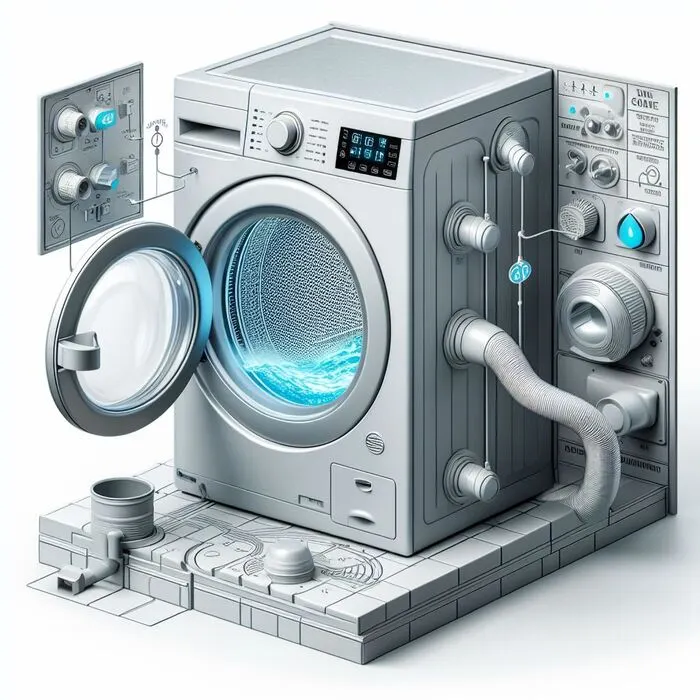Embracing Efficiency and Performance: The World of Natural Gas Dryers
I. Introduction
In the realm of household appliances, natural gas dryers stand out as efficient and cost-effective solutions for drying clothes. As we celebrate the one-year birthday of these innovative appliances, it’s essential to delve into their features, advantages, and considerations for potential users.
Advantages Over Electric Dryers
Natural gas dryers have been gaining popularity due to their notable advantages over their electric counterparts. These appliances utilize natural gas, a readily available and cost-efficient energy source, providing a compelling alternative for those seeking an environmentally friendly and economical option.
II. what is the Working Principle of Natural Gas Dryers?
Understanding the working principle of natural gas dryers unveils the sophistication behind their design. These appliances operate by harnessing the power of natural gas to generate heat, which is then utilized to evaporate moisture from clothes.
Components and Heat Exchangers
The drying process involves various components working in harmony. Heat exchangers play a pivotal role, efficiently transferring heat to the air circulating within the dryer. This results in the rapid removal of moisture from clothes, ensuring a quick and effective drying experience.
III. what are the Advantages of Natural Gas Dryers?
1. Efficiency and Cost-Effectiveness
One of the primary attractions of natural gas dryers is their efficiency in energy consumption, translating to lower operational costs. This efficiency is particularly evident in the reduced drying times, allowing users to save both time and money.
2. Drying Performance
Natural gas dryers excel in drying performance, providing faster and more effective results. This is especially beneficial for those with busy schedules or large households, where quick turnaround times for laundry are essential.
3. Environmental Friendliness
In the global push towards sustainability, natural gas dryers contribute by emitting fewer greenhouse gases compared to electric dryers. This eco-friendly aspect makes them a responsible choice for environmentally conscious consumers.

IV. what are the Considerations for Using Natural Gas Dryers?
1. Ventilation Requirements
Proper ventilation is crucial when using natural gas dryers to prevent the buildup of carbon monoxide. Ensuring adequate airflow and venting systems is imperative for a safe and effective drying experience.
2. Installation and Maintenance
Professional installation by qualified technicians is paramount to guarantee the safe and efficient operation of natural gas dryers. Regular maintenance checks are also essential to address any potential issues promptly.
3. Compatibility with Natural Gas Supply
Before investing in a natural gas dryer, users must confirm compatibility with their existing natural gas supply. This ensures a seamless integration into the household’s energy infrastructure.
V. what are the Safety Precautions?
1. Proper Installation and Grounding
Highlighting the significance of professional installation and proper grounding emphasizes the commitment to safety. Users should enlist the services of qualified technicians to install and ground the appliance correctly.
2. Regular Maintenance and Inspections
Regular maintenance and inspections should be prioritized to identify and address any issues promptly. This proactive approach ensures the ongoing safety and optimal performance of natural gas dryers.
3. Carbon Monoxide Detectors
For an additional layer of safety, the installation of carbon monoxide detectors near natural gas appliances is recommended. These detectors serve as early warning systems, alerting users to any potential gas leaks.
faq about Natural Gas Dryers
Are Natural Gas Dryers Better?
The superiority of natural gas dryers over their electric counterparts is a common inquiry. In many aspects, natural gas dryers are considered better due to their efficiency, cost-effectiveness, and faster drying times. The use of natural gas as an energy source often results in lower operational costs and reduced environmental impact, making them a preferred choice for many households.
Can Dryers Run on Natural Gas?
Yes, dryers can indeed run on natural gas. Natural gas dryers operate by utilizing natural gas as a fuel source to generate heat for the drying process. This alternative to electric dryers is widely available and offers users a choice in selecting the energy source that aligns with their preferences and infrastructure.
How Does a Natural Gas Dryer Work?
The working principle of a natural gas dryer involves harnessing the power of natural gas to generate heat. This heat is then used to evaporate moisture from clothes, facilitating the drying process. Key components such as heat exchangers play a crucial role in efficiently transferring heat to the circulating air, resulting in faster drying times and superior performance compared to electric dryers.
Do Natural Gas Dryers Need to Be Vented?
Yes, proper ventilation is a crucial consideration for natural gas dryers. Ventilation serves to prevent the buildup of carbon monoxide, ensuring a safe environment. Adequate venting allows the release of combustion byproducts and helps maintain the efficiency of the dryer. It is essential to follow recommended venting guidelines to guarantee the safe and effective operation of natural gas dryers.
Unraveling the Past: A Dive into the History of Natural Gas
To truly appreciate the innovation of modern appliances, we must understand their roots. The history of natural gas is a fascinating journey from its ancient discovery to its role as a pivotal energy source in contemporary appliances. This exploration not only provides historical context but also sheds light on the evolution of technologies like gas dryers.
Prolonging Performance: The Art of Gas Dryer Maintenance
As we embrace the efficiency of gas dryers, it’s crucial to delve into the realm of gas dryer maintenance. Simple yet essential tasks, such as cleaning lint traps and inspecting venting systems, not only extend the appliance’s lifespan but also contribute to a more sustainable and energy-efficient laundry routine.
Safety First: Navigating Gas Dryer Safety Features
Ensuring the safety of household appliances is paramount. Gas dryer safety features are designed to provide peace of mind and protect users. From automatic shut-off mechanisms to advanced sensors, understanding these features enhances not only safety but also the overall efficiency of the appliance.
Seamless Integration: The Crucial Steps of Gas Dryer Installation
Selecting the right gas dryer is just the beginning; proper gas dryer installation is equally crucial. Professional installation ensures compatibility with the natural gas supply, establishes proper ventilation, and sets the foundation for a hassle-free laundry experience.
Electric Dryers: A Closer Look at the Alternatives
While the spotlight often shines on gas dryers, it’s essential to explore electric dryers as well. Understanding the features, efficiency, and environmental impact of electric dryers provides a comprehensive view, empowering users to make informed choices based on their unique needs.
In conclusion, this journey through the history of natural gas, the intricacies of gas dryer maintenance, the importance of safety features, and the critical steps of installation offers a holistic perspective. Whether you’re a seasoned user or a first-time buyer, these insights will guide you through the efficiency, safety, and sustainability that gas dryers bring to your laundry routine.

VI. Conclusion
As we reflect on the one-year anniversary of natural gas dryers, the advantages they offer in terms of efficiency, performance, and environmental responsibility become evident. For those considering a switch or an upgrade in their laundry appliances, natural gas dryers present a compelling option. However, it is crucial to adhere to safety guidelines, ensuring a seamless and secure integration into the household.
In conclusion, the world of natural gas dryers continues to evolve, providing a promising future for energy-efficient and high-performance laundry solutions. Tailoring the choice to individual needs and circumstances will empower consumers to make informed decisions, ultimately contributing to a more sustainable and efficient home environment.







